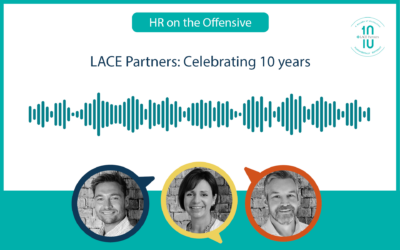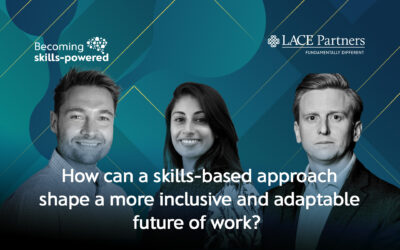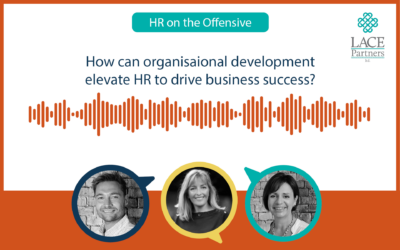In this week’s blog we hear from our very own Racheal Capel, one of our Technology Advisory Managers, about one of the most commonly heard and least well understood buzzwords in the industry: Blockchain. Read more to learn what the future may hold for Blockchain in HR.
The past 12 months has seen Blockchain increase presence in everyday conversation, with a growing number of use cases across industries and new cryptocurrencies emerging- with somewhat unpredictable valuations. But what exactly is Blockchain and how will it impact the world of HR?
What is Blockchain?
As a concept, Blockchain is a decentralised database shared among a network of computers, all of which must approve an exchange or transaction before it can be executed and recorded. This means there are multiple copies of the transaction record, available in the Cloud, to verify a transaction and ownership of an item. The item could be a Bitcoin, or it could be any other item or set of data stored in the Blockchain. One of the powerful concepts here is the proof of ownership, the entry in the Blockchain is no longer held by a central authority (a bank or a registry) but rather is available to all. At its extreme this theoretically removes the need for central ownership registries and clearing houses, but that is a potentially distant future.
Where does this fit into HR?
Whilst the technical application of blockchain can be difficult to comprehend, in essence it has the potential to allow the secure transfer of information or assets between two parties without the need of an intermediary. As the data or asset has been approved as it is passed through the network, it can be trusted to be authentic.
Examples of this in an HR perspective would mean that employee information (personal details and financial information such as payslips, pension details, employee history or certification, and more) could be stored in the Blockchain and truly owned by the individual, rather than stored within organisations HR and payroll systems. This means the data could travel with the individual and the individual could decide who to grant access to it. The data would be readily available to access, with permission from the individual, rather than having to rely on access requests to third parties.
What are some use cases for Blockchain in HR?
The ability to transfer authentic data has significant use cases within the future of HR and work technology. This is becoming increasingly recognised, including by investors as research published by Gartner indicates that blockchain is forecast to generate business value of up to $3.1 trillion by 2030.
As a starter for ten, potential cases for blockchain within HR include:
- Background Screening:
Currently this process is repeated each time an individual joins an organisation, resulting in manual processes for HR teams. Completing a background check for a new starter can take anywhere from days to weeks, which for organisations in high growth periods slows down time to hire as well as occupying HR teams. Blockchain could allow this data to be recorded and verified only once, but then could be provided directly to each employer with each new role. The data would travel with the employee rather than being held within each employer.
- Payroll:
A sensitive area with substantial risk, Blockchain could allow direct payments without the need of a bank or intermediary between an organisation and its employees. This shift would be a drastic change in mindset – for organisations and employees. Rather than your account being held by a central bank, it could sit on the Blockchain and your account could hold different currencies or payment vehicles such as the various Cryptocurrencies. Employers could then elect to pay in normal currency, cryptocurrency, or other vehicles such as NFT’s. This gives the concept of flexible benefits and entirely new dimension to consider.
- Smart contracts with temporary workers:
Currently contractors and those with temporary contracts are typically paid at regular intervals in line with invoicing windows. It can be a laborious task both for workers to itemise their work and the payroll teams to verify and sign off. Blockchain could allow for greater flexibility in this area. Smart contracts could be set up between non-salaried workers to allow instant payments upon completion of agreed tasks, projects and assignments. The employee profile could be associated with the Smart Contract and be stored in the Blockchain, allowing for more rapid background checks, onboarding, and certification compliance in addition to payments. This would not only give steady financial income to the worker but ensures project continuity for the business.
- Employee personal data:
During the course of an employee’s time at an organisation a huge amount of personal data is managed by HR teams. From a EX perspective this can mean that a seemingly simple HR request can require inputting ‘the basics’ repeatedly. By using Blockchain, data could travel with the employee and be shared securely and accurately without the need to re-enter the data each time an employee moves employer. An example of this in development is Workday’s Credentialing Technology. This will allow employees to carry their credentials from one employer to another when they change roles. This will include the details of their skills, experience and certifications which will prove powerful in roles which require regulation and up to date professional qualifications.
How will these advancements impact the HR team?
As HR teams we are moving away from being perceived as a ‘back office’ service and reinventing ourselves as more strategic players in the organisation, supporting business decisions and maximising workforce performance. This shift in perception is analysed in our latest whitepaper ‘The Future of HR Shared Services – Becoming People Experience and Solutions Experts’. Blockchain and other advancements in workplace technology continue to fuel HR’s transformation and trajectory to support and enable business strategy and move away from an administrative function.
There is often a perception that technologies such as Blockchain will ‘dehumanise’ HR. On the flipside it could be a powerful enabler to remove administrative activities and improve personal data ownership and transfer. HR teams will save time on tasks which can be streamlined, increasing their capacity to work on growth areas such as wellbeing, development and engagement.
Have questions on what you’ve read? Want to learn more about how Blockchain will – or already is – impacting HR strategy? We love discussing what we’ve written so please get in contact.






